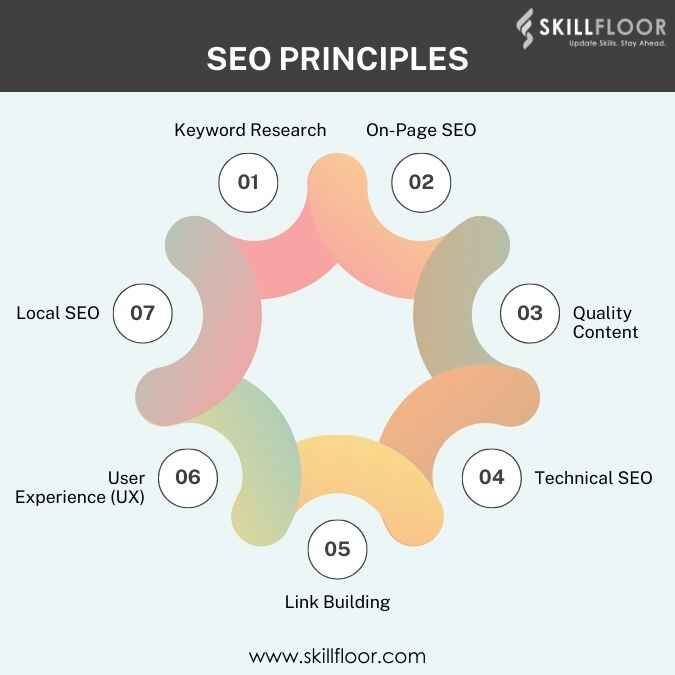The SEO Principles Every Marketer Should Know
Discover essential SEO principles to boost online visibility and drive organic traffic. Learn key strategies and best practices for effective digital marketing

Understanding SEO principles is crucial for any marketer exploring digital marketing. These principles serve as the backbone for online visibility strategies. Firstly, knowing how to conduct keyword research and strategically place keywords throughout web content is essential. SEO principles emphasize integrating keywords seamlessly into titles, headings, and body text to optimize visibility while maintaining readability. Additionally, building a strong network of high-quality backlinks is key. Prioritizing relevance and authority in link acquisition helps boost digital presence and climb search engine rankings organically.
Furthermore, staying updated on search engine algorithms and adjusting strategies accordingly is vital. Constant vigilance and quick responses to algorithmic updates ensure sustained visibility online. Also, optimizing website structure and ensuring mobile-friendliness are must-follow principles. Providing a smooth user experience across devices not only improves search engine rankings but also enhances brand credibility and user satisfaction. Mastering SEO principles empowers marketers to navigate the dynamic world of digital marketing with confidence, fostering continuous growth and engagement.
Essential SEO Principles
1. Keyword Research
Keywords are the foundation of SEO. Conducting thorough keyword research helps you understand what terms your target audience is searching for. Utilize tools like Google Keyword Planner, Ahrefs, or SEMrush to identify high-volume and low-competition keywords relevant to your business.
Tips for Effective Keyword Research:
-
Focus on long-tail keywords to target specific queries.
-
Analyze competitors' keywords to discover new opportunities.
-
Regularly update your keyword list to stay relevant.
2. On-Page SEO
On-page SEO involves optimizing individual web pages to rank higher and earn more relevant traffic. Key elements include:
-
Title Tags: Craft compelling and keyword-rich titles for each page.
-
Meta Descriptions: Write concise and informative meta descriptions to entice users to click.
-
Header Tags (H1, H2, H3): Use headers to structure your content and include relevant keywords.
-
URL Structure: Keep URLs short, descriptive, and keyword-rich.
-
Internal Linking: Link to other relevant pages on your site to improve navigation and SEO.
3. Quality Content
Content is king in the world of SEO. High-quality, relevant, and engaging content attracts and retains visitors, encouraging them to spend more time on your site.
Tips for Creating Quality Content:
-
Identify the problems that your audience faces and offer answers.
-
To engage readers, communicate in a conversational style.
-
Incorporate multimedia elements like images, videos, and infographics.
-
Update content regularly to keep it fresh and relevant.
4. Technical SEO
Technical SEO involves optimizing your website's infrastructure to ensure search engines can crawl and index your site efficiently.
Key Aspects of Technical SEO:
-
Site Speed: Ensure your website loads quickly on all devices.
-
Mobile-Friendliness: Optimize your site for mobile users.
-
XML Sitemap: Create and submit an XML sitemap to search engines.
-
Robots.txt: Use a robots.txt file to control which pages search engines can crawl.
-
Secure Sockets Layer (SSL): Secure your site with HTTPS to build trust and improve rankings.
5. Link Building
Building high-quality backlinks from reputable sites is a critical factor in improving your site's authority and ranking.
Strategies for Effective Link Building:
-
Guest Blogging: Write guest posts for authoritative blogs in your industry.
-
Broken Link Building: Identify and replace broken links on other websites with your relevant content.
-
Content Promotion: Share your content on social media and other platforms to attract links naturally.
-
Networking: Build relationships with influencers and bloggers in your niche.
6. Local SEO
If your business serves a specific geographic area, local SEO is essential. Optimizing for local search helps you attract customers from your vicinity.
Local SEO Tactics:
-
Google My Business: Create and optimize your Google My Business profile.
-
Local Keywords: Incorporate local keywords in your content and metadata.
-
NAP Consistency: Ensure your business name, address, and phone number (NAP) are consistent across all platforms.
-
Local Citations: Get listed in local directories and review sites.
7. User Experience (UX)
Google prioritizes websites that offer a positive user experience. Factors such as site speed, mobile-friendliness, and easy navigation contribute to a better UX.
Tips for Enhancing UX:
-
Simplify your website's design and layout.
-
Ensure your site is responsive and works well on all devices.
-
Improve site speed by optimizing images and leveraging browser caching.
-
Use clear and concise calls-to-action (CTAs).

How important are backlinks for SEO?
Backlinks, also known as inbound links, are links that connect one website to another and are essential for SEO. They serve as endorsements for your website, indicating to search engines that your content is trustworthy and authoritative. The quality and amount of backlinks have a significant impact on how your site ranks in search results. High-quality backlinks come from reputable and relevant websites and are more valuable than a large number of low-quality links.
Furthermore, backlinks assist search engines find new pages on your website faster. When a page is linked from a reliable source, search engine bots are more likely to crawl and index it quickly. However, it is critical to focus on generating backlinks legitimately through high-quality content and genuine relationships with other sites, as manipulative link-building tactics might result in search engine penalties.
How do Search Engines work?
Search engines use a three-step process: crawling, indexing, and ranking. Crawling involves search engine bots (also known as spiders) scouring the internet for new and updated content. These bots use links from current pages to discover new ones. Once discovered, the content is saved in an index, which is a large database of web pages.
Indexing is the process of assessing and categorizing the stuff discovered while crawling. This stage entails comprehending the context and relevance of the information to ensure that it is accurately put in the search engine database. Finally, ranking happens when a user enters a search query. The search engine sorts through its index and ranks relevant pages based on a variety of characteristics, including keyword relevancy, site quality, and user experience, to give the user the most relevant results.
For marketers hoping to thrive in the digital world, understanding SEO fundamentals is crucial. Through comprehension of the significance of keywords, the composition of high-quality content, optimization of on-page components, emphasis on mobile friendliness and page speed, acquisition of high-quality backlinks, attention to user experience, and continual monitoring of algorithm modifications, marketers can augment their online presence, draw in additional traffic, and accomplish their business goals. Accept these ideas, and you'll see significant returns on your SEO efforts.






























































